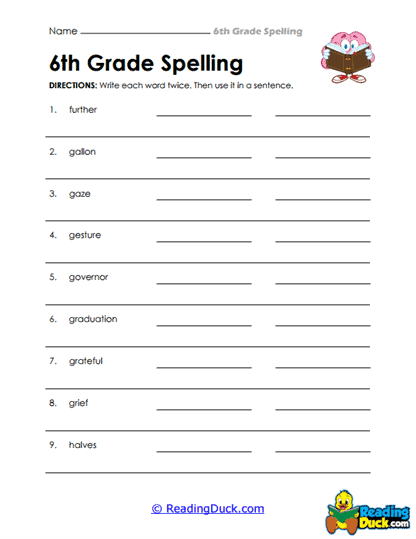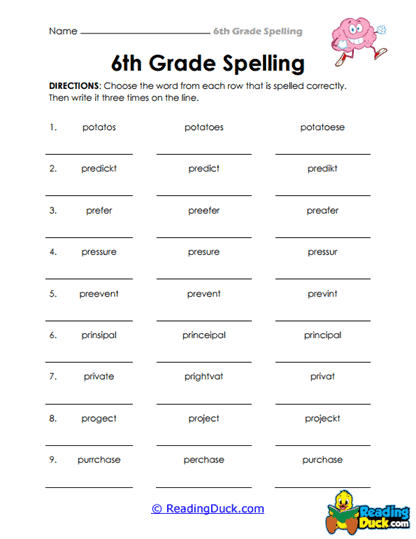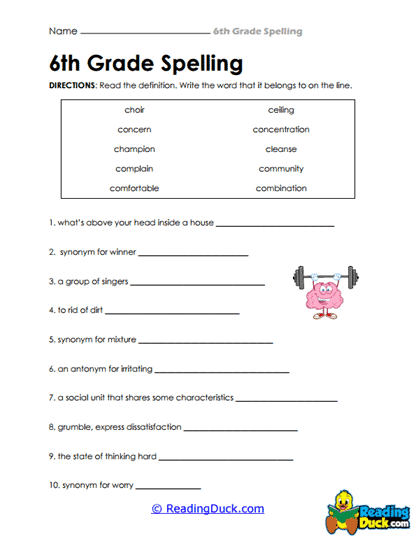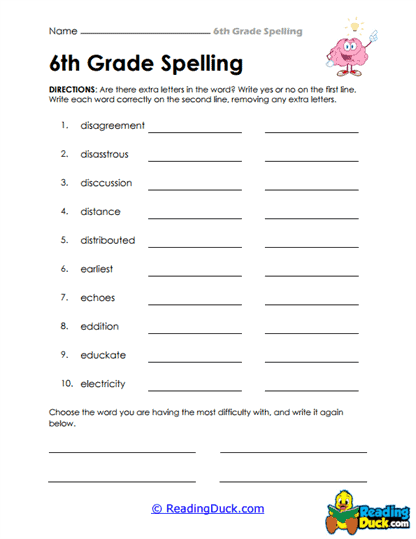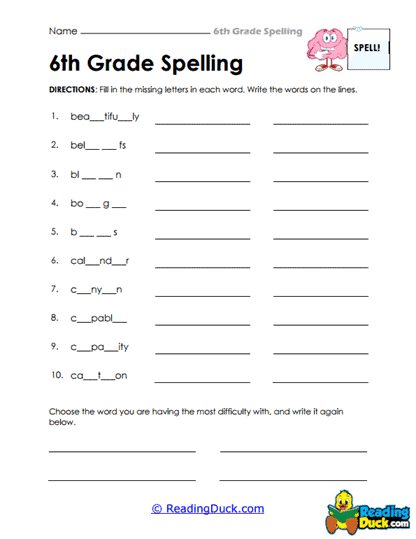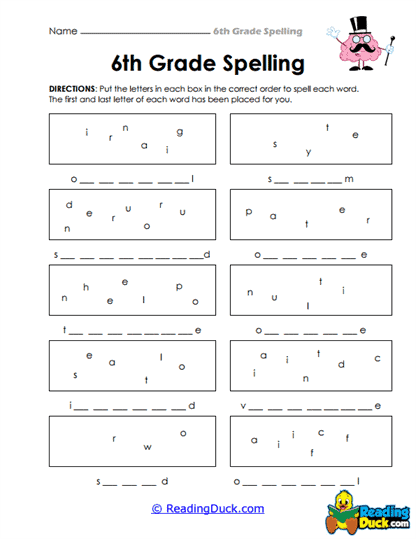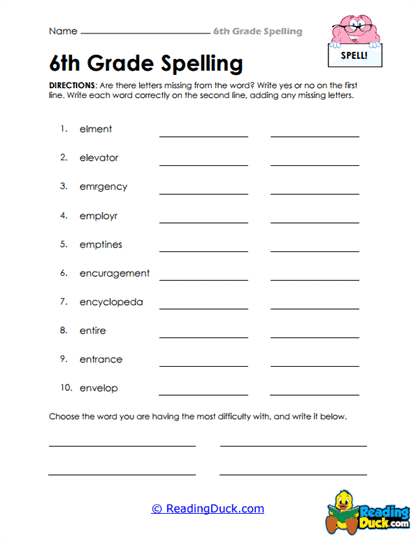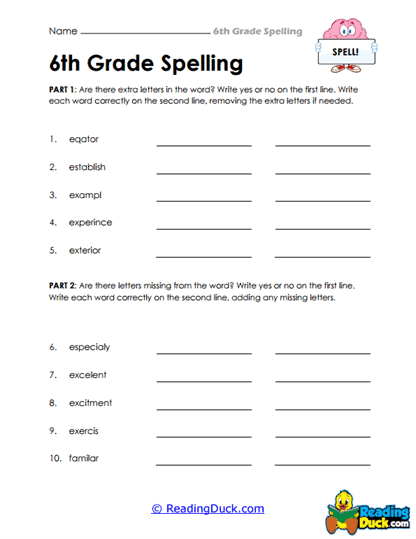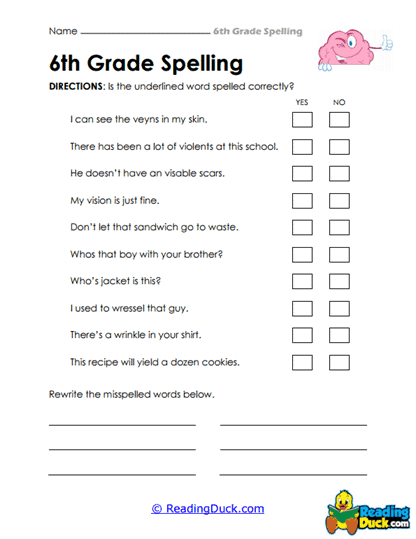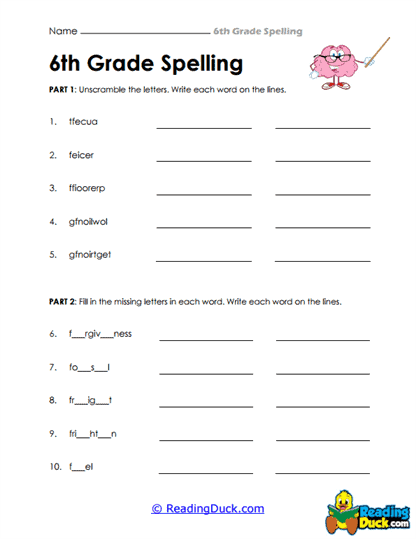6th Grade Spelling Worksheets
About Our 6th Grade Spelling Worksheets
Our collection of 6th Grade Spelling Worksheets, part of the Spelling category in the Skills section, is designed to help students strengthen their spelling abilities as they navigate increasingly complex words and language patterns. These worksheets focus on challenging word structures, diverse vocabulary, and intricate spelling rules that are essential for sixth-grade learners. They are presented in a PDF format, making them easy to view, download, and print for convenient use at home or in the classroom. Additionally, each worksheet comes with a downloadable answer key, allowing educators and parents to evaluate students' progress efficiently and provide timely feedback to enhance learning.
Exploring 6th Grade Spelling: Understanding Advanced Concepts
Sixth-grade spelling marks an important stage in a student's language development, where they transition from basic and intermediate spelling to more sophisticated and advanced word structures. At this level, students are expected to understand more challenging vocabulary, apply complex spelling rules, and develop greater language fluency. Let's break down the key elements of 6th-grade spelling to understand its depth.
Expanding Spelling Rules and Patterns
By the time students reach 6th grade, they are already familiar with basic spelling rules and patterns. However, this grade introduces them to more advanced concepts that require deeper linguistic understanding.
- Multisyllabic Words: Sixth-grade spelling focuses on teaching students to handle longer, multisyllabic words. Words like "responsibility," "communication," and "sophisticated" require students to apply syllable division rules to spell them correctly. Learning to break these words down into syllables helps students manage their complexity.
- Vowel Patterns and Syllables: Students learn how different vowel combinations and syllables affect the pronunciation and spelling of words. For example, they might explore how vowel digraphs, such as "ei" in "receive" or "ie" in "belief," follow specific patterns but also come with exceptions that students need to memorize.
- Consonant Changes with Suffixes: Another focus is on how the addition of suffixes can modify the spelling of base words. For example, adding "-ation" or "-able" to words often requires students to drop or change consonants, such as turning "communicate" into "communication" or "remark" into "remarkable." Learning how to handle these transformations helps students spell more complex words accurately.
Focus on Word Origins and Etymology
Sixth-grade spelling introduces the study of word origins, which helps students understand why certain words are spelled the way they are. This knowledge not only aids in spelling but also deepens their vocabulary comprehension.
- Greek and Latin Roots: Words that originate from Greek and Latin are common in sixth-grade spelling lists. Learning these roots gives students insight into the meaning of unfamiliar words. For example, understanding that "tele" means "distant" and "graph" means "write" helps students spell and understand words like "telegraph" and "telephone."
- Prefix and Suffix Variations: Understanding how prefixes and suffixes, many of which have Latin or Greek origins, affect word meaning and spelling is key at this level. Prefixes like "anti-" (against), "inter-" (between), and "sub-" (under) help students spell more complex vocabulary like "antibacterial," "intermediate," and "submarine."
Advanced Vocabulary Development
As students in 6th grade are exposed to more sophisticated vocabulary, spelling practice becomes an integral part of their vocabulary acquisition.
- Synonyms and Antonyms: In addition to learning how to spell more complex words, students are introduced to advanced synonyms and antonyms. For example, they may learn that "abundant" is a synonym for "plentiful" or that "scarce" is an antonym of "abundant." This helps reinforce spelling through understanding word relationships.
- Homophones and Homonyms: Sixth graders continue to refine their ability to spell homophones and homonyms, words that sound the same but have different meanings or spellings, like "their," "there," and "they're." These words often challenge students but are essential for spelling accuracy and clear communication.
Overcoming Challenges in 6th Grade Spelling
As students tackle more complex spelling rules and longer words, they are likely to face certain challenges that require specific strategies to overcome. Educators and parents can help guide students through these difficulties with effective techniques that enhance understanding and retention.
Common Challenges
- Irregular Spelling Patterns: English is known for its irregular spelling patterns, which can confuse students. For example, words like "colonel" or "foreign" do not follow typical phonetic patterns, and students must memorize their spellings.
- Silent Letters: Silent letters present another challenge. Words like "knock," "receipt," or "honest" contain letters that are not pronounced but must still be included in the correct spelling. This adds an extra layer of complexity for learners who rely heavily on phonetic cues.
- Multiple Spellings for Similar Sounds: The same sound in English can be spelled in various ways, which often leads to confusion. For instance, the long /a/ sound can be represented as "ei" in "veil," "ay" in "tray," or "a-e" in "gate." Knowing which spelling to use for each word requires careful study.
Strategies for Success
- Breaking Down Multisyllabic Words: Teaching students to break multisyllabic words into manageable parts is a key strategy. For example, dividing the word "exaggeration" into "ex-ag-ger-a-tion" makes it easier to spell each part.
- Visual Aids and Mnemonics: Using mnemonic devices or visual aids can help students remember tricky spelling rules. For instance, the mnemonic “i before e except after c” helps with words like "receive" and "believe," while visual charts for vowel patterns can clarify common sound-spelling relationships.
- Contextual Learning: Reinforcing spelling through writing activities or sentence creation helps students retain their knowledge. For example, using spelling words in a story or essay encourages students to apply their spelling skills in a real-world context, reinforcing both meaning and spelling.
Defining Characteristics of 6th Grade Spelling
Sixth-grade spelling is characterized by its emphasis on complex word structures, intricate spelling rules, and vocabulary expansion. At this level, students are expected to handle more advanced spelling tasks that reflect their growing language skills.
Key Features of 6th Grade Spelling
- Longer, More Complex Words: Sixth-grade spelling often involves longer, multisyllabic words that challenge students' understanding of word structure, such as "concentration," "irreversible," and "procrastination."
- Focus on Word Roots and Origins: Learning word roots and origins, particularly from Greek and Latin, becomes a key aspect of sixth-grade spelling, helping students break down and spell complex words.
- Advanced Homophones and Homonyms: Students continue to encounter words with similar pronunciations but different meanings and spellings, such as "affect" and "effect" or "principal" and "principle."
Sample 6th Grade Spelling List
- responsibility
- exaggeration
- independent
- perseverance
- beneficial
- unconscious
- concentration
- entrepreneur
- grammatical
- acknowledgement
Engaging Activities for Reinforcing 6th Grade Spelling
Reinforcing what students learn in spelling through engaging activities can make learning more interactive and enjoyable. These activities can be integrated into both classroom settings and homeschool environments to create a well-rounded approach to spelling.
Classroom Activities
- Word Sorts: Students can sort words based on spelling patterns, such as grouping words with similar prefixes, suffixes, or vowel patterns. This helps them recognize and internalize spelling rules.
- Spelling Relays: In this fun and interactive game, students work in teams to spell words on the board. One team member writes the first letter, the next writes the second, and so on, creating an exciting way to practice spelling.
- Word Art Projects: Have students create visual representations of their spelling words. For example, they could draw a picture incorporating the word and its meaning, reinforcing spelling through creativity.
Homeschool Activities
- Flashcard Drills: Flashcards with spelling words on one side and definitions or example sentences on the other can be an effective way for students to practice their spelling independently.
- Spelling Journals: Encouraging students to keep a spelling journal where they use their spelling words in original sentences or stories reinforces the connection between spelling, meaning, and usage.
- Online Spelling Games: There are many interactive spelling platforms that cater to 6th graders. These online games often provide engaging, self-paced ways for students to practice spelling patterns and vocabulary.
The Practical Importance of Spelling in Academic and Personal Life
Spelling is a foundational skill that not only contributes to academic success but also plays a significant role in personal communication. Mastering spelling at the 6th-grade level sets the stage for stronger writing and reading comprehension, essential skills for higher education and professional life.
In academic settings, correct spelling is key to clear and effective communication. Whether students are writing essays, reports, or emails, being able to spell accurately ensures that their ideas are presented clearly and professionally. Additionally, good spelling habits improve reading fluency, allowing students to decode and understand texts more efficiently.
In personal life, the ability to spell correctly fosters better communication in both written and digital interactions. Whether it's writing letters, emails, or social media posts, correct spelling ensures that messages are understood without confusion.
In conclusion, our collection of 6th Grade Spelling Worksheets provides students with the tools they need to master complex spelling patterns, expand their vocabulary, and develop the spelling accuracy required for academic and personal success. By engaging with these worksheets, students will enhance their language skills, becoming more confident and capable communicators.
